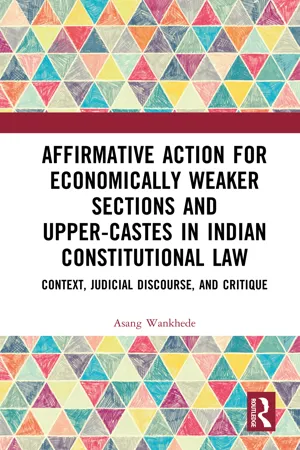
Affirmative Action for Economically Weaker Sections and Upper-Castes in Indian Constitutional Law
Context, Judicial Discourse, and Critique
Asang Wankhede
- 184 Seiten
- English
- ePUB (handyfreundlich)
- Über iOS und Android verfügbar
Affirmative Action for Economically Weaker Sections and Upper-Castes in Indian Constitutional Law
Context, Judicial Discourse, and Critique
Asang Wankhede
Über dieses Buch
This book examines the controversial 103rd Constitutional Amendment to the Indian Constitution that introduced an income and asset ownership-based new constitutional standard for determining backwardness marking a significant shift in the government's social and public policy. It also analyses state level policies towards backwardness recognition of upper-caste dominant groups through case studies of Maharashtra, Haryana, and Gujarat. It provides an analytical and descriptive account of the proliferation of reservation policy in India and critiques these interventions to assess their implication on constitutional jurisprudence. Further, it assesses the theoretical and empirical challenges such developments pose to the principle of substantive equality and scope of affirmative action policies in Indian constitutional law and general discrimination law theory. The monograph shows how opening up of reservations for dominant upper-caste groups and general category will have implications for the constitutional commitment to addressing deeply entrenched marginalisation emanating from the traditional social hierarchy and the understanding of substantive equality in Indian Constitutional law. Further, it highlights key contradictions, incoherence, and internal tension in the design of the reservations for Economically Weaker Sections
Critical, comprehensive, and cogently argued, this book will contribute and shape ongoing constitutional policy and judicial debates. It will be of great interest to scholars and researchers of law, Indian politics, affirmative action, social policy, and public policy.